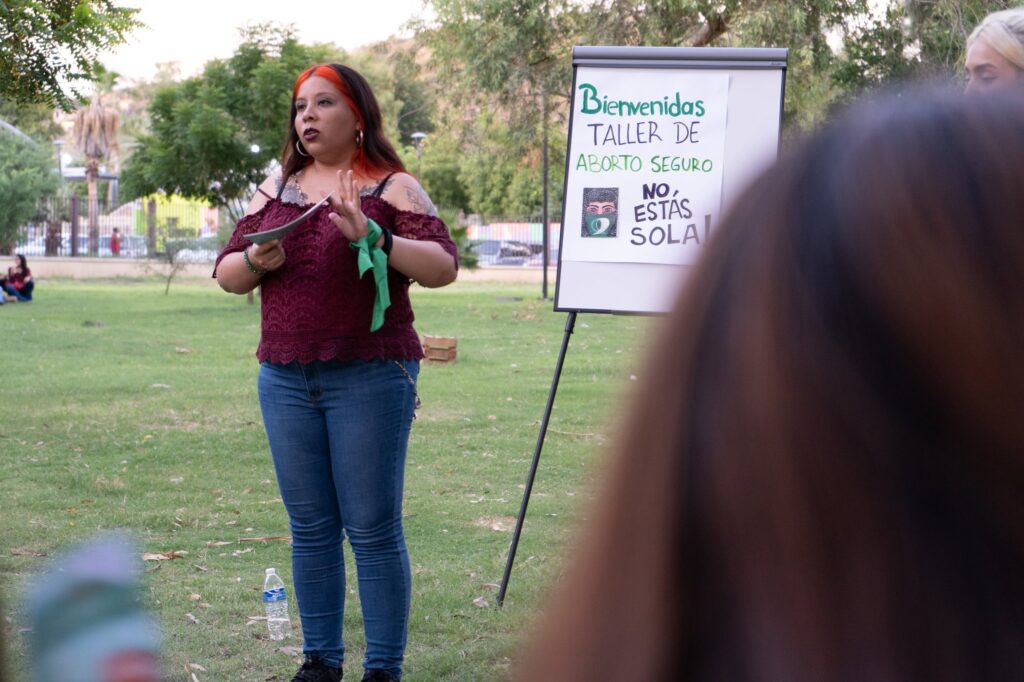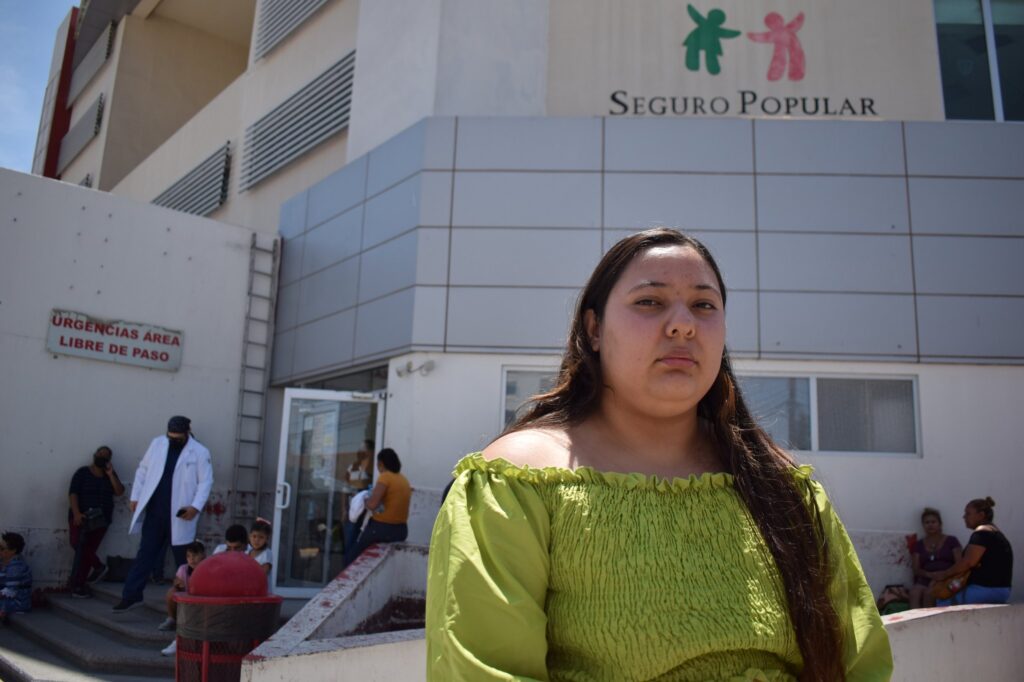Restrictions on abortion are harsh in northern Mexico. But an ‘underground railroad’ is filling the gap in services
By Dánae Vilchez y Verónica Martínez
openDemocracy / La Verdad
Alma (not her real name), a young Mexican woman, became pregnant unexpectedly in June 2021. She already had a child and had no plans to have another. But living in the northern border state of Sonora, she thought she had limited options. Abortion in Sonora is only permitted in cases of rape or if the life of the pregnant person is at risk – neither of which applied to Alma – and people can be imprisoned for up to six years.
Then, a friend told her a closely guarded secret. An ‘underground railroad’ of pro-choice activists could help Alma find a safe way to terminate her pregnancy in Hermosillo, the state capital.
A gynecologist, who is also a pro-choice activist, confirmed that Alma was around four weeks pregnant and referred her to Marea Verde, a feminist group that helps women seeking abortions. The group guided her through the process of a medical abortion, provided the pills, and was with her and her partner when she took the medication at home.
“It was the best decision I could have made in my life,” Alma says now. “I was lucky to be accompanied and safe. Despite the whole situation, it feels incredible to have that kind of company.”
Mexico’s Supreme Court has decriminalized abortion nationwide, paving the way for the federal healthcare system to provide abortions – but that won’t happen overnight. Meanwhile, abortions on request are only available in 12 of the country’s 32 states. Elsewhere, restrictions are harsh, with terminations usually only permitted in cases of sexual assault or if the pregnant person’s life is endangered.
However, thousands of Mexican women find a way to terminate their pregnancies each year. In northern states near the US border, they are frequently helped by reproductive rights activists and their network of acompañantes (‘companions’). They operate much like the 19th-century ‘underground railroad’ that helped enslaved people in the American South escape their owners and travel to the north where slavery was illegal.
In Mexico, where misinformation is rife, feminist groups can be the only reliable – and confidential – source of information on abortion. With help from allies, they operate safe houses and employ secret communication channels to help those in need of reproductive choice. The safe, non-surgical method of medical (or medication) abortion is their primary tool.
The drug misoprostol is considered by the World Health Organization as safe for triggering an abortion up to week 12. It can be used alone or in combination with mifepristone; misoprostol causes contractions and bleeding similar to an early miscarriage, while mifepristone blocks the hormone progesterone, preventing a pregnancy from progressing.
In Mexico, misoprostol is sold over the counter in pharmacies for $15 to $30 (260 to 520 Mexican pesos), but a prescription is still required for mifepristone.
In the US, mifepristone was recently approved for over-the-counter sales and misoprostol has been available over the counter in pharmacies or by mail order for more than two decades. But the US Food and Drug Administration’s approval of mifepristone has been challenged in Texas by a conservative group represented by the religious legal organization Alliance Defending Freedom. (Neither drug is legally available in US states with abortion bans – such as Texas – anyway, but the case could pave the way for others where they are still available).

Abortion solidarity
In June 2022, the U.S. Supreme Court overturned the landmark Roe v Wade ruling, ending the federal right to abortion in the U.S. and prompting several state legislatures to bring in more restrictive laws on pregnancy terminations. In response, at least 17 Mexican organizations operating along or near the Mexico-U.S. border have widened their cross-border networks to provide care to U.S. women in need of an abortion.
Their work has come amid a rising presence of anti-abortion activists in Mexico’s border states. openDemocracy and La Verdad de Juárez recently revealed how groups such as Vifac operate centres that have been accused of spreading misinformation and coercing women and girls to continue with their pregnancies.
Tokya Casimiro, an abortion companion from Hermosillo, told us that she and her colleagues are usually approached by women who don’t want their families to find out they are considering an abortion, no matter which side of the border they live on.
The companion’s role is to offer information and support, not judgment, she said. “We try to emphasize that it’s not that we don’t care what their reasons are, but rather we believe that all reasons are valid,” Casimiro explained.
Andrea Sánchez works as a companion for Aborto Seguro in the border state of Sonora. The group helps women access abortion pills, and Sánchez said she offers a wide range of support, from mental health to legal advice. “Part of our work is to discover the different contexts faced by women who need access to abortion. We can also identify if a woman is a victim of violence and suggest options to her, depending on the situation,” she said.
Ensuring access to medical abortion was the reason Sandra Cardona founded the group Necesito Abortar in Monterrey, the capital of Nuevo León, another border state, in 2016. She began using Facebook to educate people about abortion with pills. Since then, according to Cardona, the group has helped more than 20,000 people receive abortion support or information on sexual and reproductive rights, mainly in Mexico but also in other Latin American countries and the US.
Based about 220 kilometers from the Texas border, Cardona and her partner Vanessa Jiménez have set up an abortería (‘abortion shop’) at their home in a residential neighborhood of Monterrey. Abortion is severely restricted in Nuevo León, allowed only in cases of rape and life or health risks for the woman.
Cardona and Jiménez welcome women who lack a safe place for taking abortion pills, and provide them with shelter and guidance. They don’t fear persecution, despite the state criminal code, because of the Mexican Supreme Court’s ruling in 2021 that it is unconstitutional to criminalize abortion.
The two women used to deal mainly with Mexican clients or migrants on their way to the US, but this changed last year. “Typically, we gave information to women from the U.S. once every one or two months, but from September 2022, more women started to call. Some of them arrived in our town asking for help,” Cardona said. “Right now, about five or six people [from the US] are coming here every week seeking an abortion.”
Another abortion companion in the state of Chihuahua, which borders Texas, said that with one exception, all of her clients on the U.S. side were Spanish speakers and many of them lived in border communities.
Mariela Castro, who volunteers for abortion support group Marea Verde in that state, said U.S. women interested in their cross-border network usually have working-class backgrounds and few resources. “We know they are the ones who are suffering from this situation. Seeking an abortion has a lot to do with not making their living situation even more complicated,” she said.
Most women come from the bordering state of Texas, where it is illegal to perform an abortion, including by dispensing or mailing the abortion-inducing medications mifepristone and misoprostol, in most circumstances. Texas laws have narrow exceptions only to save the life or prevent “substantial impairment of major bodily function” of a pregnant patient.
Dodging criminalisation and surveillance
One of the greatest hurdles the cross-border network faces is how to transport abortion pills across the U.S. border.
For clients within Mexico, relaxed policies among local pharmacies make it straightforward to send medication by post or delivery apps. But getting medication to the U.S. is challenging. Sometimes, companions have to find friends of the U.S. client or others willing to cross the border and carry the misoprostol. In Texas, supplying abortion pills could result in a jail sentence.
Most of the abortion providers we spoke to in Mexico seem unconcerned about being prosecuted by U.S. authorities, though they worry about the security of the women they serve and their families.
But Karina de la Cruz, an activist from Marea Verde Nogales on the Arizona border, says acompañantes in Nogales have confided in her that they are afraid of being criminalised simply for carrying abortion pills in the U.S.
“The restrictions in the United States would put us or anyone willing to help us on the same level as drug traffickers, because we would be committing a crime taking the drug [misoprostol] there,” she said.
Online data security is also crucial. Salma, a companion in Chihuahua (who asked us to use only her first name), said she and many colleagues had to change their communication protocols with clients. They stopped using Meta apps such as WhatsApp, Messenger and Instagram after reports that Facebook was compelled to disclose information to state law enforcement concerning the case of an abortion for a teenager in Nebraska. The state authorities reviewed the girl’s private messages, which allegedly detailed how she had undergone a self-managed abortion.

Rising prices and shortages
Abortion restrictions in the U.S. since the overturning of Roe have also had repercussions on the demand for abortion medication in Mexico.
Several Mexican organisations interviewed by openDemocracy have struggled to get misoprostol from their usual providers. “After all these anti-abortion actions in the US, there was a shortage of misoprostol in Mexico,” Salma said. Although they managed to negotiate a low price, 240 Mexican pesos (about £11) per box compared to the usual retail price of 520 Mexican pesos (about £24), prices are rising.
Feminist group Colectiva Libre Feminista, based in Ciudad Juárez, has been raising funds for a misoprostol storage space, to help women in need on both sides of the border – on the Mexican side, and in El Paso in Texas.
If pharmacists are reluctant to sell them misoprostol pills, “we resort to asking a man to buy them, because it is easier for them than for a woman,” said Aylin Flores De la Rosa, a founding member of the group.

Mexican abortion proponents are also concerned about a potential surge in the cost of surgical abortions, as well as other sexual and reproductive health procedures.
Currently, the public system provides a limited number of these procedures free of charge, according to Laura Dorado from Aborto Seguro Chihuahua. But there are fears private healthcare institutions could spy an opportunity to offer these services for an increased fee, pricing them beyond the reach of Mexican women, but accessible to their U.S. counterparts.
“Foreigners come here for dentistry, plastic surgery, and medical procedures that are too expensive at home. They come here because it is cheap for them, but for the people who live here, it is costly,” Flores said.
Despite the challenges, activists on both sides of the border feel optimistic. Mariela Castro says: “Women in the U.S. will not stand alone as long as there are women on the other side organizing themselves.”
















